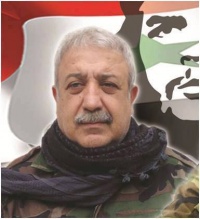Home » Syria » SYR - News » Syria: Two Cousins Disappeared Since Respective Arrests at Military Checkpoints in 2011 and 2013
On 26 November 2011, Khalid Ali Deeb was on his way to visit a friend in the main port city of Latakia when he was stopped at a checkpoint on the main square by members of the Military Intelligence Division (also known as the "Military Security") dressed in civilian clothes, who immediately arrested him without presenting an arrest warrant. At that time, the Military Security was conducting military operations to prevent protests from taking place, during which they would arrest people who were believed to have taken part in past demonstrations.
Following his arrest, Khalid's family tried to informally contact an officer of the Military Security to inquire about his whereabouts, but to no avail. Since then, his fate and whereabouts remain unknown.
A year and a half later, on 2 May 2013, Khalid's cousin, Mohammad Ali Deeb, was going to visit his family when he was stopped at a checkpoint between the village of Al Bayda and the seaport of Baniyas, 60km south of Latakia, by members of the "Syrian resistance", a pro-Assad militia, dressed in military uniforms who arrested him immediately and burned his house shortly thereafter. Fearing further reprisals, his family did not take action to try to locate him. Mohammad's fate and whereabouts thus remain unknown to date.
Left with no other resort at the national level, the Khalid and Mohammad's families contacted Human Rights Guardians and Alkarama in the hope they could help shed light on their relatives' respective fates and whereabouts. In view of the facts, the above-mentioned organisations seized the WGEID asking this UN special procedure on human rights to call upon the Syrian authorities to release them immediately or, at the very least, to put them under the protection of the law by disclosing their whereabouts and allowing their family to visit them without restriction.
In view of the systematic violations of human rights committed in Syria, Alkarama urges the State authorities to take action to:
• Put an end to the systematic and widespread practice of the crime of enforced disappearance;
• Combat impunity for perpetrators of human rights violations;
• Ratify the International Convention for the Protection of All Persons from Enforced Disappearance (CED).
For more information or an interview, please contact the media team at This email address is being protected from spambots. You need JavaScript enabled to view it. (Dir: +41 22 734 1008).
 Algeria
Algeria Bahrain
Bahrain Djibouti
Djibouti Egypt
Egypt Iraq
Iraq Palestine/Israel
Palestine/Israel Jordan
Jordan Kuwait
Kuwait Lebanon
Lebanon Libya
Libya Mauritania
Mauritania Morocco
Morocco Oman
Oman Qatar
Qatar Saudi Arabia
Saudi Arabia Sudan
Sudan Syria
Syria Tunisia
Tunisia United Arab Emirates
United Arab Emirates Yemen
Yemen Other Countries
Other Countries







